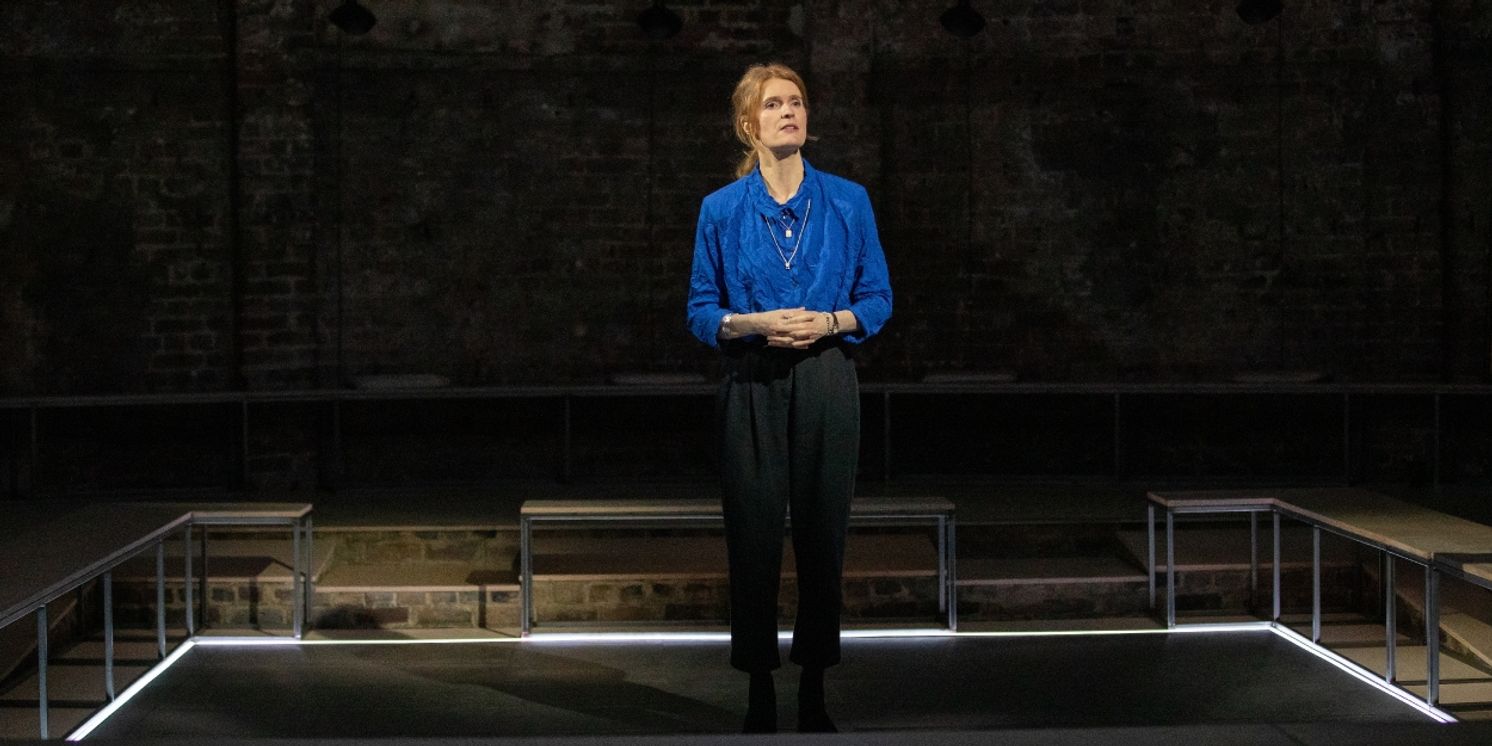Review: ALMA MATER, Almeida Theatre
An unforgiving production that explores the wreckage of rape culture.

![]() A severe allegation threatens the balance of the college Jo manages. The first ever female headmaster of her institution, she finds herself torn between her instincts as a woman and the professional diligence she’s bound to follow. Faced with the rightful demands for an immediate reaction, the pressure from the board, and the rising unrest online, Jo freezes.
A severe allegation threatens the balance of the college Jo manages. The first ever female headmaster of her institution, she finds herself torn between her instincts as a woman and the professional diligence she’s bound to follow. Faced with the rightful demands for an immediate reaction, the pressure from the board, and the rising unrest online, Jo freezes.
Alma Mater is the byproduct of fourth-wave feminism, with faint echoes of David Mamet’s Oleanna flipped on its head and delivered with a sleight of hand. Polly Findlay is back at the Almeida to direct Kendall Feaver’s world premiere, which finally officially opens after a troubled start. The withdrawal of Lia Williams, who was initially due to take on Jo, doesn’t seem to hinder this unfortunately relevant and unforgiving production, with Justine Mitchell taking over with an assured stance.
This is a politically charged piece of theatre led with ideas rather than a specific plot. It crawls into the space between action and delay, analysing the shades of grey of contemporary feminism as well as the inevitable clash of genders, generations, and backgrounds. It’s far from being an exhaustive representation of the multi-faceted nature of the issue, but Feaver does an excellent job putting conflicting positions equally under the spotlight. She accepts the #MeToo movement, then breaks it down to rebuild it again. Alma Mater gets a lot right, but also puts too many irons on the fire, even adding a storyline about a third-year undergraduate struggling to reconcile his Muslim faith with his identity as student.

Photo Credit: Marc Brenner
It launches off as a clever comedy, with Mitchell introducing a character whose profound sarcasm and cynical perspectives add a layer of utter delight to an otherwise very serious play. Fever has a knack for a good one-liner and Mitchell knows how to deliver. The humour sours quickly to lift the veil on rape allegations and cancel culture. On the other side of the ring, social justice warrior Nikki feels everything so deeply. A budding journalist who wants to change the world, she jumps at the chance to make a difference when Paige reveals that a drunken freshers’ night resulted in being assaulted in her own bed. Acknowledging that Jo isn’t being proactive, Nikki takes it to the internet. What ensues is pretty much what happened when Alyssa Milano took Tarana Burke’s #MeToo to Twitter. People begin to come forward, the department is threatened with a scandal.
What transpires is that the outcome of the problem is dehumanising regardless of the path taken to address it. Everyone will always have their own interests at heart. Jo wants to protect her position, the board needs to avoid public embarrassment, Nikki demands answers, Paige wishes to move on. They all desperately crave someone to blame. That’s where Feaver’s conversation gets interesting. Is the toxic environment of the school responsible for a single person’s actions? The master herself thinks debauchery is part of the experience. Or is the boy’s mother at fault? After all, she’s never discussed consent with her child. What about Nikki? She’s the one who made everything public. And Paige? She was drunk and can’t remember her assault. Something has to give.
.jpg?format=auto&width=1400)
Photo Credit: Marc Brenner
The intense clash of objectives and personalities becomes a tool to prove a point. By the end, the piece tastes like an act of penance for all those who have minimised how to deal with circumstances like this before. Feaver doesn’t provide any sort of resolution or explanation. The final (and only) confrontation between Paige and Jo is the apex of her writing, giving a sense that everything has finally aligned and their strife has come to fruition. But it isn’t enough. The text maintains an air of grandeur that doesn’t extend to the inquiry of the subject. Though the script is riddled with big words worthy of its Oxbridge setting, it avoids the plunge into the murky waters of the tangible fallout of a trial by media. What happens next is a mystery.
Nonetheless, Findlay’s project has generated impressive performances across the company. Mitchell herself is a force of nature. Unhindered by the short notice and armed with her highlighted dialogue, she reaches an astonishing achievement. Where her take on Jo has the tendency to “bulldoze a conversation” (her friend Leila, Nathalie Armin, says), Mitchell conceals a smidge of gender insecurity. Phoebe Campbell shares a lot of her same headstrong traits as Nikki, clouded by the beautiful, youthful audacity of a young woman who desperately wants to mark her place in history in the same way as Jo probably did. They both give passionate portrayals that back their respective points of view fearlessly.
%20(1).jpg?format=auto&width=1400)
Photo Credit: Ali Wright
Muddling the power dynamics even more, Nathaniel Parker is Michael, the chair of the board. Married to Jo’s best mate and the one who appointed Jo, he’s the personification of a conflict of interests. Leila ends up being the only truly and thoroughly rational figure in the mix, with Armin offering a heartfelt and sensible character and sitting on the same bench as Liv Hill’s Paige in terms of affable virtue. Findlay reflects this equilibrist feat of Feaver’s by toying with the visual distance of the actors. Vicki Mortimer designs a utilitarian set vaguely in the shape of a boxing ring where clear signs of toxic masculinity go head to head with the indifference and excuses shown to sexual violence.
It’s a grim picture. The institution is too wrapped up in their obscure traditions and overt unaddressed perversion to do anything of importance. Victims will still pop up and the university will still manage to dodge any kind of everlasting controversy as long as this structure of unapologetic abuse is allowed to continue. With Alma Mater, Feaver essentially reiterates that the master’s tools will never dismantle the master’s house.
Alma Mater runs at the Almeida until 20 July.
Photo credits: Ali Wright and Marc Brenner
Reader Reviews
Videos

